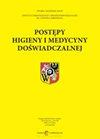姜黄素对肠易激综合征患者症状和生活质量的影响
IF 0.3
4区 医学
Q4 MEDICINE, RESEARCH & EXPERIMENTAL
引用次数: 0
摘要
肠易激综合征(IBS)是许多胃肠病学咨询的原因。由于肠易激综合征的发病机制多因素,治疗困难。即使是用新药治疗也不令人满意。最近关于肠易激综合征治疗的报道强调了姜黄素可能的有益作用。该研究的目的是评估姜黄素对肠易激综合征患者的疗效和安全性。材料和方法我们的非对照研究纳入了51例患者:30例(58.8%)女性和21例(41.2%)男性,根据罗马标准IV诊断为IBS, 35例以腹泻为主(IBS- d)变体,16例以便秘为主(IBS- c)变体。采用IBS症状严重程度评分(IBS- sss)和IBS生活质量量表(IBS- qol)在0、4和12周时间点对所有患者的生活质量和症状严重程度进行评估。结果姜黄素治疗4周和12周后,IBS-SSS评分明显降低(p < 0.01),特别是腹胀和腹痛严重程度组。使用姜黄素4周后,IBS-SSS平均评分从279.7分下降到202.2分(p < 0.05)。在服用姜黄素的前4周,与基线访问相比,IBS-QoL问卷的总体得分显著增加(41,9 vs. 53,4;P < 0.05)。没有副作用的报道与姜黄素的使用有关。结论姜黄素能有效减轻IBS患者的临床症状,提高患者的生活质量。它还具有很高的安全性。本文章由计算机程序翻译,如有差异,请以英文原文为准。
The effect of curcumin on symptoms and quality of life in patients with irritable bowel syndrome
Abstract Introduction Irritable bowel syndrome (IBS) is the cause of numerous gastroenterological consultations. Due to multifactorial pathogenesis, treatment of IBS is difficult. Even the management with new medications appears unsatisfactory. Recent reports on IBS therapy highlight the possible beneficial effect of curcumin. The aim of the study was to assess the efficacy and safety of curcumin in IBS patients. Materials and Methods Our non-controlled study included 51 patients: 30 (58.8%) women and 21 (41.2%) men diagnosed with IBS based on Roman Criteria IV, 35 patients with diarrhea-predominant (IBS-D) variant and 16 with constipation-predominant (IBS-C) variant. The quality of life and severity of symptoms were assessed with the IBS Symptom Severity Score (IBS-SSS) and IBS Quality of Life Instrument (IBS-QoL) questionnaires in all patients at: 0, 4, and 12-week time points. Results A statistically significantly lower IBS-SSS score was found after 4 and 12 weeks of using curcumin (p < 0.01), especially in the category of bloating and severity of abdominal pain. After 4 weeks of using curcumin, a reduction in the mean IBS-SSS score decreased from 279.7 to 202.2 points (p < 0.05). There was a significant increase in the overall score obtained with IBS-QoL questionnaire after the first 4 weeks of taking curcumin compared to baseline visit (41,9 vs. 53,4; p < 0.05). No side effects have been reported associated with the curcumin use. Conclusions In summary, curcumin is effective in reducing the IBS clinical symptoms and improving the patients’ quality of life. It also has a high safety profile.
求助全文
通过发布文献求助,成功后即可免费获取论文全文。
去求助
来源期刊

Postȩpy higieny i medycyny doświadczalnej
MEDICINE, RESEARCH & EXPERIMENTAL-
CiteScore
0.60
自引率
0.00%
发文量
50
审稿时长
4-8 weeks
期刊介绍:
Advances in Hygiene and Experimental Medicine (PHMD) is a scientific journal affiliated with the Institute of Immunology and Experimental Therapy by the Polish Academy of Sciences in Wrocław. The journal publishes articles from the field of experimental medicine and related sciences, with particular emphasis on immunology, oncology, cell biology, microbiology, and genetics. The journal publishes review and original works both in Polish and English. All journal publications are available via the Open Access formula in line with the principles of the Creative Commons licence.
 求助内容:
求助内容: 应助结果提醒方式:
应助结果提醒方式:


